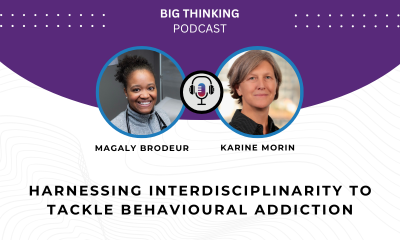This past year, policymakers and educators have scrambled to put online learning and radically altered classroom learning protocols in place. How have parents, students, and educators been impacted by these changes? What lessons can we find to guide long-term adaptations for a safe school year? Social science and humanities researchers across the country are seeking answers to these questions and more.
Professor Emma Duerden, the scientific lead of the Developing Brain research program at the University of Western Ontario, is an expert in child cognitive development. Since COVID-19, her research team has pivoted to studying optimal online learning methods for primary school children in Ontario and the impacts of changing school environments on parents’ stress and children’s behaviour.
The first phase of the project investigated children’s shifting behaviours and screen time use during the pandemic. By surveying parents, the researchers have learned that:
- Daily screen time has nearly doubled for primary aged children from an average of 2.6 hours to 5.8 hours (not including online school activities).
- Parents reported moderate to high stress levels, with greater stress reported by parents with multiple children or a child with special needs.
- When parents were highly satisfied with the virtual education experience of their child, they also reported less time spent by their child watching tv, and lower stress.
The changes being implemented now can have vast consequences for child development, warns Duerden. On the importance of this research, she explains, “People often think of children as being resilient to stress. However, that might not be true for all children and some children may be more vulnerable to stress than others. We wanted to put a magnifying glass on how the stress associated with the ongoing pandemic can affect the well-being of parents and children. Our goal is to inform guidelines and develop resources for teachers and parents to help their kids thrive.”
Dr. Beyhan Farhadi, working with Dr. Sue Winton, is investigating the process of educational adaptations during COVID-19. Their research within the Faculty of Education at York University investigates how teachers understood and enacted online learning policies introduced by governments and school boards during pandemic-related school closures in Ontario and Alberta.
Preliminary findings have found conflicting interpretations of policy and directives related to online teaching and assessment. Additionally, they have found a significant digital divide within and between geographic regions, insufficient support for students with special education needs, and a significant toll on the mental health and well-being of teachers.
Meanwhile, graduate researcher Iris Lamb, working within the Faculty of Education at Brock University, is exploring the unique experiences of kindergarten teachers as they navigate this shift to online learning for their largely pre-literate students.
Results of these projects will aid in the development of stronger supports for students, particularly those from equity-seeking groups, and inform policymakers, administrators, parents, and other stakeholders about the unique challenges — and opportunities — of a pivot to online learning during emergencies.

What does Canada gain when postsecondary connects?
← Big Thinking Podcast homepage Introduction | About the guests | Transcript | Follow us Introduction Canada’s future is being written in the places where people learn and in how those places connect. If collaboration holds the key to shaping that...

Canada's AI leadership calls for all expertise at the table
After bringing together humanities and social sciences AI experts for a consultation with the federal government’s AI Strategy Task Force on October 20, the Federation submitted the following on October 31. Written submission to the AI Task Force...

Harnessing interdisciplinarity to tackle behavioural addiction
← Big Thinking Podcast homepage Next episode → Introduction | About the guest | Transcript | Follow us Introduction Why is it essential to combine perspectives, expertise, and methodologies from different fields to better understand the complexity...
